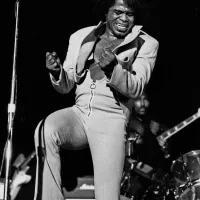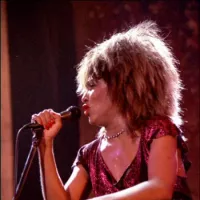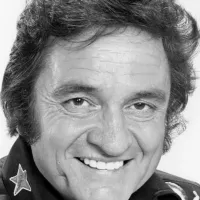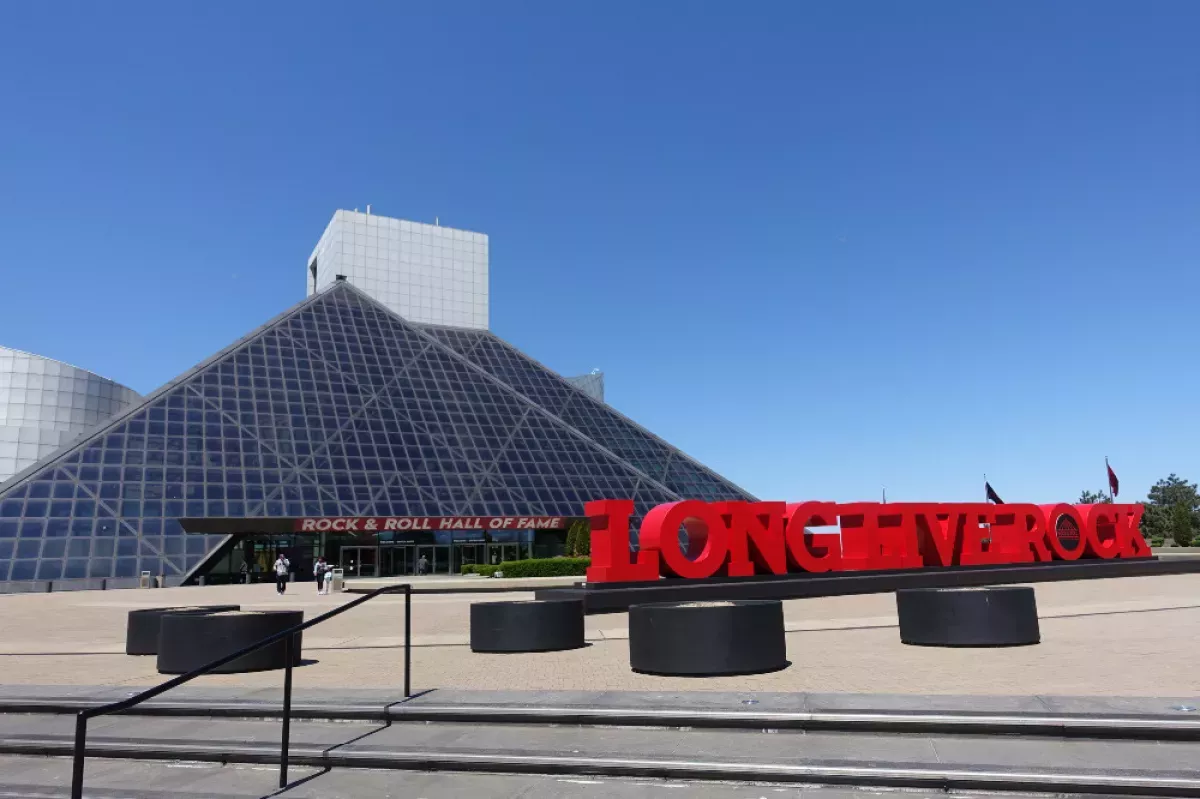The Rock and Roll Hall of Fame, located in Cleveland, Ohio, is dedicated to preserving and showcasing the history of rock music. The museum features exhibits on influential artists, producers, and industry professionals who have shaped the genre.
1936: "Wabash Cannonball" on the List
Roy Acuff's 1936 version of "Wabash Cannonball" was included in the "500 Songs That Shaped Rock and Roll" exhibit.
1955: Start of the "Rock Era"
1955 is often considered the start of the "rock era".
1957: Bruce Springsteen's 1957 Chevrolet on Display
The Annex showcased iconic pieces like Bruce Springsteen's own 1957 Chevrolet, adding a tangible link to rock history.
1965: Start of the Psychedelic Era
The year 1965 marked the beginning of the psychedelic era, a period of significant cultural and musical transformation.
1967: Monterey Pop Festival
The Monterey Pop Festival, held in 1967, became a defining moment of the psychedelic era, featuring groundbreaking performances.
1969: End of the Psychedelic Era
The psychedelic era is generally considered to have ended in 1969, leaving a lasting impact on music, art, and society.
April 20, 1983: Establishment of the Rock and Roll Hall of Fame Foundation
On April 20, 1983, Ahmet Ertegun, the founder and chairman of Atlantic Records, established the Rock and Roll Hall of Fame Foundation.
1983: Founding of the RRHOF Foundation
The RRHOF Foundation was founded in 1983 by Ahmet Ertegun and a team including Jann S. Wenner, Seymour Stein, Bob Krasnow, Noreen Woods, Allen Grubman, and Suzan Evans.
January 23, 1986: First Induction Ceremony
The inaugural Rock and Roll Hall of Fame induction ceremony took place on January 23, 1986, with Elvis Presley, James Brown, Little Richard, Fats Domino, Ray Charles, Chuck Berry, Sam Cooke, the Everly Brothers, Buddy Holly, and Jerry Lee Lewis among the inductees.
May 5, 1986: Cleveland Selected as Permanent Home
On May 5, 1986, the Hall of Fame Foundation officially announced Cleveland as the permanent location for the Rock and Roll Hall of Fame and Museum.
1986: Cleveland's Bid for the Hall of Fame
Cleveland actively campaigned to host the museum in 1986, with civic leaders pledging substantial funds and highlighting the city's rock and roll history.
1986: Elvis Presley's Induction into the RRHOF
Elvis Presley, known as the "King of Rock and Roll," was among the first inductees into the RRHOF in 1986.
1986: Cleveland Chosen as Hall of Fame's Home
In 1986, after a long search, Cleveland was selected as the permanent location for the Rock and Roll Hall of Fame.
1986: First Inductions Without a Home
The Foundation initiated the induction of artists in 1986, even though the Hall of Fame didn't yet have a physical building.
1986: Start of Annual Inductions
The Rock and Roll Hall of Fame began selecting new inductees annually starting in 1986.
January 12, 1993: Induction Ceremony in Los Angeles
The Rock and Roll Hall of Fame induction ceremony was held in Los Angeles on January 12, 1993.
June 7, 1993: Groundbreaking Ceremony for the Rock Hall
The groundbreaking ceremony for the Rock and Roll Hall of Fame building was held on June 7, 1993, with notable figures like Pete Townshend, Chuck Berry, and Billy Joel present.
1993: Los Angeles Hosts Inductions for the First Time
The induction ceremonies were held in Los Angeles for the first time in 1993.
1993: Deep Purple Becomes Eligible for Induction
The rock band Deep Purple becomes eligible for induction into the Rock and Roll Hall of Fame in 1993.
1994: Resumption of New York City Inductions
The formal induction ceremonies resumed in New York City in 1994.
September 1, 1995: Dedication of the Rock and Roll Hall of Fame Museum
On September 1, 1995, the new Rock and Roll Hall of Fame Museum, designed by architect I. M. Pei, was dedicated.
1995: 500 Songs That Shaped Rock and Roll
The "500 Songs That Shaped Rock and Roll" exhibit, a list of influential songs from the 1920s to the 1990s, was unveiled in 1995 as part of the museum's opening.
April 1996: Hall of Fame Series Begins
The Hall of Fame Series, featuring interviews with Hall of Fame inductees, began in April 1996.
1996: American Music Masters Series Begins
The American Music Masters series, a concert series honoring inductees, was launched in 1996 with a tribute to Pete Seeger.
1996: Black History Month Celebration
The Rock and Roll Hall of Fame began celebrating Black History Month with concerts, film screenings, and lectures in 1996 to highlight the contribution of African Americans to rock and roll.
May 6, 1997: Induction Ceremony in Cleveland
The Rock and Roll Hall of Fame induction ceremony took place in Cleveland on May 6, 1997, marking the first time the event was held in the city where the museum is located.
May 10, 1997: Opening of "I Want to Take You Higher: The Psychedelic Era, 1965–1969"
On May 10, 1997, the Rock Hall opened its first major exhibit, "I Want to Take You Higher: The Psychedelic Era, 1965–1969", showcasing artifacts from iconic artists and events.
1997: Temporary Exhibits at the Rock Hall
Since 1997, the Rock and Roll Hall of Fame began hosting a variety of temporary exhibits, ranging in scale and theme.
1997: Jimmie Rodgers Honored
The American Music Masters series honored Jimmie Rodgers in 1997.
1997: Cleveland Hosts Inductions for the First Time
The induction ceremonies were held in Cleveland, the hall of fame's home, for the first time in 1997.
August 8, 1998: Opening of "Elvis is in the Building"
The Rock Hall's first solo artist exhibition, "Elvis is in the Building," opened on August 8, 1998, paying tribute to Elvis Presley.
1998: Robert Johnson Honored
The American Music Masters series honored Robert Johnson in 1998.
1998: Continuation of New York City Inductions
The induction ceremonies continued to be held in New York City in 1998.
September 5, 1999: Closing of "Elvis is in the Building"
The Elvis Presley exhibition, "Elvis is in the Building," concluded on September 5, 1999, after a successful run.
November 11, 1999: Opening of "Roots, Rhymes and Rage: The Hip-Hop Story"
The groundbreaking hip-hop exhibition, "Roots, Rhymes and Rage: The Hip-Hop Story," premiered on November 11, 1999.
1999: Kiss Becomes Eligible for Induction
The rock band Kiss becomes eligible for induction into the Rock and Roll Hall of Fame in 1999.
August 6, 2000: Closing of "Roots, Rhymes and Rage: The Hip-Hop Story"
The influential hip-hop exhibition, "Roots, Rhymes and Rage: The Hip-Hop Story," concluded on August 6, 2000.
October 20, 2000: Opening of "Lennon: His Life and Work"
The exhibition "Lennon: His Life and Work," exploring the life and legacy of John Lennon, opened on October 20, 2000.
2000: Sidemen Award Introduced
A new category called the "Sidemen" award was introduced in 2000 to honor session and concert players.
2000: Last Early Influences Induction Until 2009
Nat King Cole and Billie Holiday were inducted into the Rock and Roll Hall of Fame as Early Influences in 2000. This marked the last time anyone received this honor until 2009.
2000: Muddy Waters Honored
The American Music Masters series honored Muddy Waters in 2000.
2001: "Our Band Could Be Your Life" Published
Michael Azerrad's book "Our Band Could Be Your Life", profiling influential American alternative bands from the 1980s, was published in 2001.
2001: Bessie Smith Honored
The American Music Masters series honored Bessie Smith in 2001.
January 1, 2003: Closing of "Lennon: His Life and Work"
The John Lennon exhibition, "Lennon: His Life and Work," concluded on January 1, 2003.
2003: Buddy Holly Honored
The American Music Masters series honored Buddy Holly in 2003.
2004: Sidemen Award Becomes Dormant
After being given out for a few years, the "Sidemen" award became dormant in 2004.
2004: Iron Maiden Becomes Eligible for Induction
Iron Maiden becomes eligible for induction into the Rock and Roll Hall of Fame in 2004.
2004: Lead Belly Honored
The American Music Masters series honored Lead Belly in 2004.
2006: Partnership for New York City Branch Museum
In 2006, the RRHOF collaborated with entertainment production companies to establish a branch museum in New York City.
2006: List Expanded to "The Songs That Shaped Rock and Roll"
The "500 Songs That Shaped Rock and Roll" list was expanded to include more songs and renamed "The Songs That Shaped Rock and Roll" in 2006, with the latest additions being Gnarls Barkley's "Crazy" and My Chemical Romance's "Welcome to the Black Parade".
2006: Roy Orbison Honored
The American Music Masters series honored Roy Orbison in 2006.
2006: Sex Pistols Boycott Ceremony
The Sex Pistols, inducted into the Rock and Roll Hall of Fame in 2006, refuse to attend the ceremony, expressing their disdain for the institution.
March 14, 2007: Controversy over Dave Clark Five's Exclusion from Rock & Roll Hall of Fame
On March 14, 2007, a controversy erupted when Roger Friedman of Fox News published an article alleging that the Dave Clark Five, despite receiving more votes than inductee Grandmaster Flash and the Furious Five, were excluded from the Rock & Roll Hall of Fame. Friedman claimed Jann Wenner, founder of Rolling Stone magazine, exploited a technicality to ensure a rap act's induction. While the Dave Clark Five did receive more votes, Wenner's reported belief that a rap act was overdue influenced the decision.
2007: Genre Exclusion Criticized
Author Brett Milano points out the Hall of Fame's neglect of genres like progressive rock, '60s Top 40, New Orleans funk, and black music in 2007.
2007: Voters Boycott Ballot
Several voters, including former nominating committee member Joel Selvin, refuse to participate in the Rock and Roll Hall of Fame voting process in 2007, citing a lack of deserving candidates.
2007: Sidemen Award Remains Dormant
The "Sidemen" award continued to be dormant in 2007.
2007: No Ahmet Ertegun Award Given
The Ahmet Ertegun Award, which honors non-performers in the music industry, was not given out in 2007.
2007: Global Financial Crisis Impacts Annex
The global financial crisis of 2007 contributed to the Annex's closure, highlighting the economic challenges faced by cultural institutions.
November 18, 2008: Opening of the Rock and Roll Hall of Fame Annex NYC
The Rock and Roll Hall of Fame Annex NYC opened in Manhattan's SoHo district on November 18, 2008.
2008: Ahmet Ertegun Award Established
Following the death of the Rock and Roll Hall of Fame co-founder, the "Non-Performers" award is renamed in his honor to the Ahmet Ertegun Award in 2008.
2008: New York City Remains Induction Host
New York City remained the location for the induction ceremonies in 2008.
2008: Sidemen Award Re-activated
The "Sidemen" award was reactivated in 2008 after a period of dormancy.
2008: Les Paul Honored
The American Music Masters series honored Les Paul in 2008.
2008: Financial Crisis and Tourism Decline
The Annex's closure in 2008 was partly attributed to the global financial crisis and a subsequent drop in tourism in New York City.
2009: Cleveland Hosts Inductions Again
Cleveland hosted the induction ceremonies for the second time in 2009.
2009: No Ahmet Ertegun Award Given
For the second time, the Ahmet Ertegun Award was not given out in 2009.
2009: Public-Private Partnership for Induction Week
In 2009, a public-private partnership funded a week of events surrounding the inductions in Cleveland.
2009: Successful Induction Week in Cleveland
The 2009 induction week in Cleveland was a major success, attracting a large audience and generating significant economic impact.
2009: Janis Joplin Honored
The American Music Masters series honored Janis Joplin in 2009.
2009: 25th Anniversary Concert
The Rock and Roll Hall of Fame celebrated its 25th anniversary with a two-day concert series on October 29 and 30, 2009, at Madison Square Garden in New York.
2009: Induction Ceremony Returns to Cleveland
The Rock and Roll Hall of Fame induction ceremony was held in Cleveland again in 2009.
2009: Wanda Jackson Inducted
Wanda Jackson was inducted as an Early Influence in 2009, becoming the first artist in this category whose career primarily took place after 1955, the traditional start of the "rock era".
January 3, 2010: Closure of the Rock and Roll Hall of Fame Annex NYC
The Rock and Roll Hall of Fame Annex NYC in Manhattan closed on January 3, 2010, due to financial challenges and a decline in tourism.
2010: Sidemen Award Renamed
The "Sidemen" award was renamed to the "Award for Musical Excellence" in 2010.
2010: Fats Domino and Dave Bartholomew Honored
The American Music Masters series honored Fats Domino and Dave Bartholomew in 2010.
2010: New York City Continues as Induction Host
The induction ceremonies were once again hosted in New York City in 2010.
2010: Twelve Artists Nominated
The nominating committee for the Rock and Roll Hall of Fame puts forward twelve artists for induction in 2010.
2011: Number of Inductees Predetermined
It is revealed that the number of inductees for the Rock and Roll Hall of Fame is predetermined before the voting process, with five inductees selected in 2011.
2011: Aretha Franklin Honored
The American Music Masters series honored Aretha Franklin in 2011.
2012: Cleveland Hosts Inductions for the Third Time
Cleveland hosted the induction ceremonies for the third time in 2012.
2012: Elton John Criticizes Hall After Donna Summer's Death
Following Donna Summer's death, Elton John criticizes the Rock and Roll Hall of Fame for not inducting her while she was alive.
2012: Induction of Backing Groups
In 2012, six backing groups—the Miracles, the Famous Flames, the Comets, the Blue Caps, the Midnighters, and the Crickets—were inducted into the Rock and Roll Hall of Fame. This decision aimed to address past controversies where these groups were excluded when their lead singers were inducted.
2012: Another Successful Induction Week
The 2012 induction week in Cleveland replicated the success of 2009, further cementing the city's role as the Hall of Fame's home.
2012: Chuck Berry Honored
The American Music Masters series honored Chuck Berry in 2012.
2012: Induction Ceremony in Cleveland
The Rock and Roll Hall of Fame induction ceremony was once again held in Cleveland in 2012.
2012: Continued Support for Induction Week
The successful partnership continued in 2012, funding another week-long celebration of the inductions in Cleveland.
2013: Charlotte Church Calls Out Gender Bias
During the BBC Radio 6 Music's Annual John Peel Lecture, singer Charlotte Church accuses the Rock and Roll Hall of Fame of having a gender bias, pointing to the low representation of female artists.
2013: Los Angeles Hosts Inductions for the Second Time
Los Angeles hosted the induction ceremonies for the second time in 2013.
2013: Induction Ceremony Returns to Los Angeles
The Rock and Roll Hall of Fame induction ceremony returned to Los Angeles in 2013.
2014: Kiss Inducted
After being eligible since 1999, Kiss is finally inducted into the Rock and Roll Hall of Fame in 2014.
2014: New York City Hosts Inductions Again
New York City hosted the induction ceremonies once more in 2014.
2014: The Everly Brothers Honored
The American Music Masters series honored The Everly Brothers in 2014.
2015: Cleveland Hosts Inductions for the Fourth Time
Cleveland hosted the induction ceremonies for the fourth time in 2015.
2016: Deep Purple Inducted
Deep Purple, eligible since 1993, is inducted into the Rock and Roll Hall of Fame after a lengthy wait.
2016: "Louder than Words: Rock, Power, Politics" Exhibition During RNC
During the 2016 Republican National Convention in Cleveland, the Rock Hall hosted a major exhibition titled "Louder than Words: Rock, Power, Politics."
2016: Steve Miller and Rick Nielsen Criticize Hall
Steve Miller, during his induction speech and subsequent interviews, and Rick Nielsen of Cheap Trick both criticize the Rock and Roll Hall of Fame. Miller points out the lack of female representation and support for music education, while Nielsen criticizes the expensive ticket policy for inductees and their families.
2016: Inductions Return to New York City
The induction ceremonies returned to New York City in 2016.
2017: Sister Rosetta Tharpe Inducted
Despite being considered the godmother of rock and roll, Sister Rosetta Tharpe wasn't inducted into the Hall of Fame until 2017.
2017: Rolling Stone Magazine Exhibit
In 2017, the Rock and Roll Hall of Fame hosted a major temporary exhibit that focused on the history and impact of Rolling Stone magazine.
2017: New York City Continues as Induction Host
New York City remained the location for the induction ceremonies in 2017.
2018: Bruce Dickinson Criticizes Hall
Iron Maiden's Bruce Dickinson labels the Rock and Roll Hall of Fame "an utter and complete load of bollocks", criticizing the institution and its perceived bias.
2018: Mark Knopfler Skips Ceremony
Mark Knopfler, frontman of Dire Straits, does not attend the band's induction ceremony for the Rock and Roll Hall of Fame in 2018 without providing an official explanation.
2018: Alternating Induction Locations Begin
Starting in 2018, the induction ceremonies began alternating annually between New York and Cleveland.
September 2019: Rock Hall Honors Concert
The American Music Masters series was renamed Rock Hall Honors in September 2019, with Mavis Staples as the first performer.
2019: Ian Hill Comments on Hall's Genre Bias
Judas Priest bassist Ian Hill suggests a potential bias against heavy metal in the Rock and Roll Hall of Fame's induction process during an interview.
2019: Inductions Held in New York City Again
The induction ceremonies were held once again in New York City in 2019.
2020: Dave Matthews Band Snubbed
Despite topping the fan vote, the Dave Matthews Band is not inducted into the Rock and Roll Hall of Fame in 2020, sparking criticism.
2020: Webby People's Voice Award
The Rock and Roll Hall of Fame won the 2020 Webby People's Voice Award for Cultural Institution in the Web category.
February 2021: 338 Inductees
By February 2021, the Rock and Roll Hall of Fame had inducted 338 artists and individuals.
2021: Cleveland Hosts Inductions Again
As part of the alternating schedule, Cleveland hosted the induction ceremonies again in 2021.
February 2022: Dolly Parton Nominated for Rock & Roll Hall of Fame
In February 2022, country music icon Dolly Parton was nominated for induction into the Rock & Roll Hall of Fame, sparking debate about the genre's boundaries and recognition within the institution.
March 2022: Dolly Parton Requests Removal from Rock & Roll Hall of Fame Ballot
In March 2022, after ballots were sent out, Dolly Parton requested to be removed from consideration for the Rock & Roll Hall of Fame. In a statement, she expressed her gratitude for the nomination but stated that she didn't believe she had "earned that right" and didn't want to split votes. The Hall of Fame responded that she would remain on the ballot, emphasizing the deep roots of rock and roll in country music and acknowledging Parton's significant influence on the genre and youth culture.
April 2022: Dolly Parton Expresses Willingness to Accept Rock & Roll Hall of Fame Induction
In April 2022, following her initial request to be removed from the ballot and the ensuing debate, Dolly Parton stated in an interview with NPR's Morning Edition that she would accept induction into the Rock & Roll Hall of Fame if she were to be selected.
2022: Los Angeles Hosts Inductions for the Third Time
Los Angeles hosted the induction ceremonies for the third time in 2022.
2022: Alternative and Indie Rock Exclusion Highlighted
Music critic Steven Hyden calls out the Rock and Roll Hall of Fame for ignoring American alternative and indie rock bands of the 1980s, as highlighted in Michael Azerrad's book "Our Band Could Be Your Life" published in 2001.
2023: Courtney Love Criticizes Hall
Courtney Love criticizes the Rock and Roll Hall of Fame for the delayed induction of female artists like Kate Bush, Nina Simone, Carole King, Linda Ronstadt, and Tina Turner, as well as the continued omission of Chaka Khan.
2023: Inductions Return to New York City
The induction ceremonies were held in New York City in 2023.
2024: Liam Gallagher Criticizes Hall
In response to Oasis's nomination for the Rock and Roll Hall of Fame class of 2024, Liam Gallagher publicly criticizes the institution on social media.
Mentioned in this timeline

Sir Elton John is a highly successful British singer songwriter...
Fox News Channel FNC is a conservative American news and...

James Brown an iconic American singer songwriter dancer and musician...

Tina Turner the Queen of Rock 'n' Roll was a...

Johnny Cash the Man in Black was a highly influential...

Linda Ronstadt is a versatile American singer renowned for her...
Trending
2 months ago Jacksonville area anticipates rain as warm trend persists in Northeast Florida, Southeast Georgia.

8 months ago Wozniacki and Williams address retirement; Wozniacki eyes Paolini as French Open dark horse.

3 months ago Rybakina stuns Swiatek, Advances to WTA Finals Semifinal in Riyadh

3 months ago Donna Vekic at WTA Chennai, Jones debuts, Parry Prediction, Chennai Open 2025

3 months ago Republicans Question Trump's Drug War and Military Actions: A Shift in Stance?

3 months ago Aryna Sabalenka aims for first WTA Finals title amid strong competition in Riyadh.
Popular

Thomas Douglas Homan is an American law enforcement officer who...

William Franklin Graham III commonly known as Franklin Graham is...

Jupiter is the fifth and largest planet from the Sun...

XXXTentacion born Jahseh Dwayne Ricardo Onfroy was a controversial yet...

Kristi Noem is an American politician who has served as...

Instagram is a photo and video-sharing social networking service owned...
